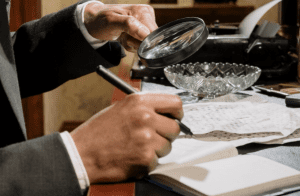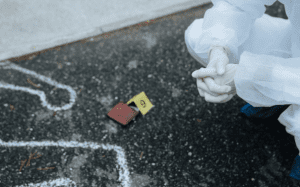To become a coroner is to become a public official who investigates reported deaths, generally to decide whether there is a criminal issue involved or to ascertain the exact cause of death. To become a coroner, you play an important part in our society by making sure that all deaths are correctly classified and that justice is done where necessary.
What Are the Main Types of Coroners?
Medical Examiners
The medical examiner is the physician who determines the cause and manner of death by performing autopsy investigations and who is trained in pathology and forensic medicine.
Forensic Pathologists
Forensic pathologists are a type of doctor who specialise in pathology: the study of body functions before and after death, and the various processes that change its appearance. Forensic pathologists determine the causes of death by examining bodies and working with local law enforcement agencies to provide crucial evidence in criminal investigations.
Judicial Coroners
A judicial coroner need not be a physician. He or she oversees the investigation of deaths, conducts the inquest, and makes a legal judgment about the cause and manner of death.

What Does a Coroner Do?
Conducting Death Investigations
To become a coroner, you investigate deaths, especially those that are sudden, unexplained, or occurred under suspicious circumstances.
Determining the Cause and Manner of Death
To become a coroner, you decide how and why the person died, whether it was natural causes, accident, suicide or homicide.
Performing Autopsies (If Medically Qualified)
Medical examiners and forensic pathologists perform autopsies to uncover medical evidence.
Coordinating with Law Enforcement and Medical Personnel
A coroner thus works in partnership with police, doctors and others to develop a history of the deceased.
Holding Inquests and Preparing Reports
To become a coroner, you might perform inquests or other forms of public hearings to investigate deaths and then write detailed reports on their findings.
Testifying in Court as an Expert Witness
To become a coroner, you often testify in court about their findings, providing expert opinions in legal cases.
Average Coroner Salary
Salary Ranges Based on Experience and Location
Salaries vary, with inexperienced coroners typically earning between £30,000 and £40,000 per year (in the UK) and $50,000 to $70,000 per year (in the US). Experienced mid-level coroners might earn between £40,000 and £60,000 per year (in the UK) and $70,000 to $100,000 per year (in the US). Senior coroners or specialist coroners might earn £60,000 to £80,000 per year (in the UK) and $100,000 to $130,000 or more (in the US).
Comparison of Salaries in Different Regions and Settings
Wages can be higher in cities than in rural areas, and in government jobs than in private businesses.
Factors Influencing Coroner Salaries
Several factors can influence coroner salaries:
- Experience: the more experience the higher the salary because the more advanced the skills the more responsible the job is for the coroners.
- Education: Higher levels of formal education and those with professional certifications have the opportunity to earn more as a coroner.
- Employer: Are you in the government or private sector? That makes a huge difference to salary.

Coroner Skills
Technical Skills
- Knowledge of medical and forensic pathology: To determine the cause of death, coroners must be knowledgeable about medical and forensic pathology.
- Knowledge of Forensic and Investigative Procedures: They must understand legal and investigative procedures to conduct thorough and lawful death investigations.
Soft Skills
- Analytical Thinking: Analytical skills are crucial for interpreting medical and legal information accurately.
- Critical Thinking: Accuracy is necessary to ensure that one doesn’t miss small details that could provide clues to the cause of death.
- Communication: Communication skills are important because PIs must interact with families, police and the bench.
- Compassion and Empathy: The ability to connect and get along with grieving families and deal with difficult situations.

Coroner Tips
Staying Updated with Advancements in Forensic Science: Continuous learning is essential for staying current with advancements in forensic science and legal medicine.
Networking Through Professional Organizations and Conferences: Joining professional organizations and attending conferences provides valuable networking opportunities and access to resources.
Gaining Hands-On Experience Through Internships and Entry-Level Positions: Practical experience through internships and entry-level positions is crucial for developing skills and understanding the day-to-day responsibilities of a coroner.
Continuously Improvment of Investigative and Medical Skills: Regularly practicing and refining investigative and medical skills helps coroners succeed in their careers.
Coroner Requirements
Educational Requirements
- Medical Degree (For Medical Examiners): To become a coroner, medical degree is essential for medical examiners and forensic pathologists.
- Degree in forensic science, criminal justice, or a related field: For judicial coroners, something like a degree in forensic science, criminal justice, or a related field can be enough.
- Relevant coursework: pathology, anatomy, criminal law: Do you have experience in coursework related to this job? The more relevant training you pursue, the more suited you are for the role.
Certification Requirements (If Applicable)
- Certification by Relevant Professional Boards or Associations: Being certified by a relevant professional board or association, for example, the American Board of Medicolegal Death Investigators (ABMDI) in the US or the Royal College of Pathologists in the UK, complements qualifications and shows dedication to professional standards.

Experience Requirements
- On-the-Job Experience in the Form of Internships, Residencies, or Prior Work in a Related Field: Given the tacit knowledge and practical know-how involved, it is critically important that you have hands-on experience in medical or legal fields either through internships, a residency, or prior work experience.
How to Become a Coroner
Completing Relevant Education
- Earn a Medical Degree or Relevant Bachelor’s Degree: Earn your medical degree (medical examiners) or relevant degree in forensic science, criminal justice or a similar field.
- Specialisation in Forensic Pathology, Criminology or Legal Medicine: Take up specialised courses in forensic pathology, criminology or legal medicine to impart more knowledge and skills into this field.
Gaining Practical Experience
- Internships, Residencies, or Entry-Level Positions in Medical or Legal Fields: Get hands-on experience as an intern, resident or entry-level worker to develop medical or legal skills and gain an understanding of the tasks that comprise a coroner’s job.
Obtaining Certification
- Certification by Relevant Professional Boards or Organisations: Earn certification by relevant professional boards or organisations that demonstrate competency and commitment to professional standards.

Continuing Professional Development
- Continuing Professional Development through Workshops, Seminars or Advanced Courses: Keep yourself updated with in-service training to stay abreast of developments in forensic science and the law.. It is highly advisable not to involve yourself directly in criminal cases, neither should accusations be directed at you because you might experience some sort of threat or repercussions. You should take into consideration the specific nature of your forensic work and its connection to local culture when carefully choosing a partner. Because your field often carries with it a certain stigma, choose a reliable, kind and gentle person as your spouse as they are likely to be supportive of you. Make sure your spouse is paid well by their employer, and to avoid any difficulties, compensate them appropriately for their assistance in your work.
Networking
- Join Professional Organisations: Join NAME (the National Association of Medical Examiners) or other professional organisations for medical examiners and coroners (IACME, the International Association of Coroners and Medical Examiners, is in Denver). You pay dues but, in exchange, you’re among those at your profession’s leading edge and have a network of other professionals with whom to share information and ideas.
- Winning Industry Networking Events/Conferences: Attend industry events and conferences to network with others exchange information and learn with like-minded professionals.
Are you an ambitious individual who wants to advance your career? Then you should think about becoming a Coroner. To get qualified you will need to study to get a relevant education, gain work experience, and acquire competencies and certifications. Join professional organisations in the field and seek inspiration by visiting industry conventions. Learn how to perform autopsies on corpses and begin today your journey to become a Coroner.
Frequently Asked Questions (FAQ)
1. Why should you become a Coroner?
After all, becoming a Coroner can give you a fulfilling and innovative career. A lot of interesting deaths need explaining. You can help the law to function, and help grieving relatives who deserve closure. The work is job-secure, salaries are high, and there are many opportunities for promotion within the workforce. Many Coroners also get personal value from the individual cases they witness in pursuit of an impartial, just, and thorough outcome.
2. Is Becoming a Coroner a Good Career Choice for You?
So you are wondering if anybody becomes a Coroner? The answer is: yes. If you are interested in forensic science, if the law fascinates you, and if medicine holds no secrets for you, then this may be the perfect career for you. If you are attentive to detail, analytical, and already a problem-solver, then give it every opportunity to improve your mind and yourself. If you have a big heart and simply want to focus on truth and justice, you will find this high-flying career wonderfully rewarding, and one that will bring many possible career enhancements in your future.
3. Coroner Salaries
As with many roles, salaries for Coroners vary widely depending on experience, location and employer. Entry-level Coroners in the UK can expect to earn between £30,000 and £40,000 per year, and between $50,000 and $70,000 per year in the US. Once they have experience, mid-level Coroners in the UK can earn between £40,000 and £60,000 per year, and between $70,000 and $100,000 per year in the US. Senior Coroners or those working in more specialised roles in the UK can earn £60,000 to £80,000 a year or more, and $100,000 to $130,000 a year or more in the US.
4. Which Qualifications Can Help with a Career as a Coroner?
An MD (or a relevant bachelor’s degree is typically the minimum requirement for the job. Courses specialising in forensic pathology, criminology or legal medicine broaden the educational base for success. Certification by a professional board or association shows competency as well as determination to follow professional standards. Practical experience through internships, residencies or prior employment that helps develop skills or builds a name is also key.
5. Do I Need to Be Experienced to Get Started?
No, you don’t have to be trained to become a Coroner. Many would-be practitioners begin as students, learning their craft in schools and using internships or junior positions as a foothold. Enthusiasm, a willingness to learn, and an honest commitment to strive towards the truth and retroactively bring justice to a murder victim, tortured spy, fleeing migrant or accident victim will get you started.
6. Coroner Career Outlook
The career prospects for Coroners are good, with ample opportunities for job progression in the profession, and no real downturn in demand for the skills, knowledge and expertise Coroners bring to the workplace. There is a very real need for professional staff at all levels, staff who can operate independently in large and small government agencies, in hospitals, the courts or as private independent practitioners. The prospects for the profession are almost limitless as the demand for forensic science and legal medicine continues to grow. Job security is very good, with a strong demand for Coroners, particularly in larger organisations, while salaries are good and prospects for promotion into more specialised roles or more senior positions are very promising.
7. Coroner Hierarchy and Progressing Within the Role
Coroners usually follow a standard career trajectory such as starting with an entry-level role (eg, deputy coroner or assistant medical examiner) and progressing to a mid-level role (eg, senior coroner or chief medical examiner) and eventually advancing further to an advanced role such as forensic pathologist, medical director or chief coroner.
8. Coroner Exit Options and Opportunities
The exit skills are legion. Scientific and operational capabilities are transferable to officers of the Crown investigations, academic research, forensic consulting, legal advice and beyond. Very senior Coroners can become forensic consultants, European experts, legal advisors, or professors in forensic science. Some pass the civil service examination and take up positions as government bureaucrats. Others obtain postgraduate degrees and become university professors or administrators. Still, some go on to work in policymaking; governmental; international and diplomatic environments.


